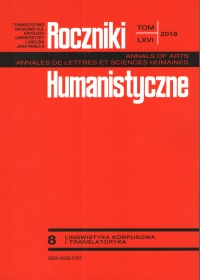Modélisation du contexte des lexies spécialisées en vue de l’élaboration d’un système d’aide à la rédaction scientifique dans le domaine biomédical
Abstrakt
Modelizacja kontekstu leksyki specjalistycznej w celu wypracowania systemu wspomagania redagowania artykułów naukowych w biomedycynie
Autorki proponują modelizacje informacji kontekstualnej wokół leksemów specjalistycznych w celu wypracowania systemu wspomagania redagowania prac naukowych w dziedzinie biomedycyny. Pod uwagę brana jest tu modelizacja kontekstu zdaniowego opisanego jako schematy aktantowe, które maja charakter semantyczny. Modelizacja ta opiera się na obszernym korpusie artykułów naukowych z biomedycyny, a także na Typach Semantycznych ontologii danej dziedziny, Unified Medical Language System.
Modélisation du contexte des lexies spécialisées en vue de l’élaboration d’un système d’aide à la rédaction scientifique dans le domaine biomédical
Dans cet article nous proposons une modélisation de l’information contextuelle autour des lexies spécialisées en vue de l’élaboration d’un système d’aide à la rédaction scientifique dans le domaine biomédical. Nous considérons plus spécifiquement la modélisation du contexte phrastique décrit en termes de schémas actantiels que nous caractérisons sémantiquement. Cette modélisation est fondée sur un grand corpus d’articles scientifiques dans le domaine biomédical. Elle s’appuie également sur les Types Sémantiques d’une ontologie du domaine, Unified Medical Language System.
Bibliografia
Aluísio Sandra M., Barcelos Iris, Sampaio Jandir, & Oliveira Osvaldo N., 2001, « How to learn the many unwritten “rules of the game” of the academic discourse: a hybrid approach based on critiques and cases to support scientific writing » [in :] Advanced Learning Technologies Proceedings. IEEE International Conference, 257-260.
Barnes Caroline, Boutron Isabelle, Giraudeau Bruno, Porcher Raphael, Altman Douglas G., & Ravaud Philippe, 2015, « Impact of an online writing aid tool for writing a randomized trial report: the COBWEB (Consort-based WEB tool) randomized controlled trial » [in :] BMC medicine, 13(1), 1.
Kinnunen Tomi, Leisma Henri, Machunik Monika, Kakkonen Tuomo, & Lebrun Jean-Luc, 2012, « SWAN-scientific writing AssistaNt: a tool for helping scholars to write reader-friendly manuscripts » [in :] Proceedings of the Demonstrations at the 13th Conference of the European Chapter of the Association for Computational Linguistics, 20-24.
Kübler N. & Pecman M., 2012, « The ARTE bilingual LSP dictionary: From collocation to higher order phraseology » [in :] Electronic Lexicography, S. Granger & M. Paquot (eds). Oxford: Oxford University Press, 187-209.
Lebrun Jean-Luc, 2011, « Scientific writing 2.0: a reader and writer's guide », World Scientific.
Lerat Pierre, 1995, « Langues spécialisées », PUF, Paris.
L’Homme Marie-Claude, 2016, « Terminologie de l’environnement et Sémantique des cadres » [in :] Congrès mondial de linguistique française (CMLF 2016), Tours, France.
L’Homme Marie-Claude, 2014, « Why lexical semantics is important for e-lexicography and why it is equally important to hide its formal representations from users of dictionaries » [in :] International Journal of Lexicography 27(4).
L’Homme Marie-Claude, Robichaud Benoît & Leroyer Patrick, 2013 « Encoding collocations in DiCoInfo: From formal to user-friendly representations » [in :] Electronic Lexicography, Oxford : Oxford University Press, 211–236.
Thomas Izabella, 2016, « Ecrire en langues spécialisées : méthodes et outils du traitement automatique des langues au service de l’autonomie des rédacteurs », HDR, Université de Franche-Comté, UFR des Sciences du Langage, de l'Homme et de la Société.
Yan Rui, Hatier Sylvain, 2016, « L’extraction et la modélisation de patrons lexico-syntaxiques pour leur enseignement en FLE : un exemple à partir du verbe montrer » [in :] Linguistik Online 78 (4).
Volanschi Alexandra, Kübler Natalie, 2010, « Building an electronic combinatory dictionary as a writing aid tool for researchers in biology » [in :] Sylviane Granger, Magali Paquot (eds.). e Lexicography in the 21st Century: New Applications, New Challenges, Louvain-la-Neuve : Presses Universitaires de Louvain, 343-355.
Wandji Ornella, L’Homme Marie-Claude, Grabar Natalia, 2013, « Discovery of Semantic Frames for a Contrastive Study of Verbs in Medical Corpora » [in :] Terminology and Artificial Intelligence, TIA.
Copyright (c) 2018 Roczniki Humanistyczne

Utwór dostępny jest na licencji Creative Commons Uznanie autorstwa – Użycie niekomercyjne – Bez utworów zależnych 4.0 Międzynarodowe.





